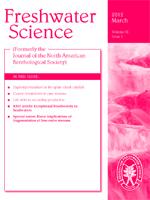Emulation of natural disturbance (END) is an emerging paradigm for modern, ecosystem-based forest management in North America. On the premise that periodic disturbance is an integral part of natural, determinative processes on forest landscapes, managing forests by emulating natural disturbance is thought to produce landscape patterns that resemble those arising from natural disturbances and that are known to maintain critical processes and habitat for conserving biodiversity. Applying END principles to forest watersheds has implications for the protection of aquatic ecosystems because END can include intentional logging disturbance near water to emulate natural riparian disturbance. Literature shows that logging in watersheds, and especially in riparian areas, can lead to negative abiotic and biotic effects in aquatic ecosystems. However, an integration of the current understanding of land–water linkages in forest watersheds with general disturbance ecology would suggest that periodic watershed and riparian disturbances may be natural renewal processes that are required for long-term sustainability of aquatic ecosystems. Previous syntheses of END in forestry failed to consider the implications for aquatic ecosystems, and most forest-management guidelines default to the protection of water resources by systematic riparian (shoreline) buffers. This paper introduces the concepts of END and provides a theoretical basis for using intentional riparian forest disturbance to sustain aquatic habitat complexity and ecosystem integrity.
How to translate text using browser tools
24 January 2012
Introduction and a theoretical basis for using disturbance by forest management activities to sustain aquatic ecosystems
David P. Kreutzweiser,
Paul K. Sibley,
John S. Richardson,
Andrew M. Gordon

Freshwater Science
Vol. 31 • No. 1
March 2012
Vol. 31 • No. 1
March 2012
aquatic ecosystem sustainability
forest watershed
logging impacts
natural disturbance emulation




